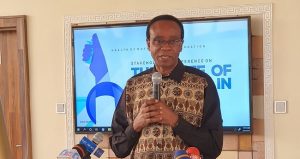It has often been said that one of the ways to colonise a people is by dismantling or subverting their culture. This pathway is also effective for building dependency and disrupting the systems that organically secures the health of the populations.

In terms of agricultural and food systems, the disruption is most effective when staple crops are targeted, appropriated through patenting and presented as mere merchandise. Food is fast becoming an instrument of control and power.
Science has been used as a cloak for the introduction of foods of dubious value and quality. The quest to solve perceived problems through artificial means introduces new problems, some of which can be intractable. Today we see unrelenting forces seeking to control our food and agricultural systems with attendant disregard for indigenous knowledge, natural cycles, biodiversity, and livelihoods of communities.
We are concerned that food is being seen as a mere commodity or a mechanical or chemical product from a factory or laboratory. Truth is that eating is beyond swallowing food to satiate hunger; food has deep cultural and spiritual anchors with special significance in many religious observances.
Food supply across Africa depends largely on the maintenance of a healthy and thriving biodiversity. Our farmers save, reproduce, and share seeds, understanding that these seeds encapsulate life. These communities engage in mixed cropping and harvest a mix of fruits, tubers and vegetables that yield foods that are rich and healthy, providing needed nutrition and building defenses against illnesses.
They have a strong link to what is presented as food and harvests are never mechanical exercises. Moreover, many of our farmers do not see food production as mere business or for profit.
These practices are being threatened by the genetic modification of seeds particularly those that make up our staple foods.
Today we are speaking of the genetically engineered cowpea, popularly known as beans in Nigeria, and drawing attention to the fact that the insecticidal beans can also kill non-target organisms and that even the target pests can develop resistance. In the same vein, when crops are genetically engineered to withstand herbicides, we cannot ignore the fact that they kill other plants and microbial life and not only the so-called weeds. These modifications interfere with the webs of life in ecosystems, and this has intergenerational consequences.
Although the promoters of the Bt cowpea claim that it will translate to improved food security in Nigeria due to availability of much higher amounts of cowpea, one concern that cannot be overlooked is that this GM variety will utterly contaminate natural varieties through cross pollination.
This means that even where a farmer chooses not to grow the GM variety, the preferred natural variety will be contaminated. Thus, rather than promote food security, Nigeria/Africa is stepping into an era of uncertainty, of gross unpredictability and instability of food supply and resultant food insecurity.
The genetically engineered beans (recently approved for commercial release in Nigeria despite objections by HOMEF and several other stakeholders) is modified with the transgene Cry1Ab which has not been approved anywhere else in the world. Most of these genetically engineered events are prepared overseas and brought for testing in Africa and yet we boast that we are adequately equipped and innovative.
The genetically engineered cowpea is originally a Monsanto product brought to Africa on supposedly humanitarian grounds. We insist that Africans must not be used as testing ground for novel and risky technologies.
Promoters of these risky technologies fight against strict liability clauses in national Biosafety laws. This has been experienced in Nigeria, in Zambia and in Uganda and so on. In Uganda a clause in their genetic engineering regulatory law was inserted to ensure that producers of GMOs will be held accountable for any harm that may come from cultivation or consumption of their products at any time, even if such effects manifest years later. Since then, GMO promoters and producers scientists have branded President Museveni and the Ugandan parliament as being anti-science.
There are attempts to overlook the Precautionary Principle which is the bedrock of biosafety regulation. Simply put, the precautionary principle advice that where there are doubts regarding human, animal or environmental safety, we should hold the breaks. Good genetic engineering science must not leave room for doubt and when harms manifest, the producers should be held strictly liable.
The speed with which Nigeria is permitting GMOs is highly suspicious and offers no assurance that the government is concerned about food safety, the preservation of our biodiversity or the rights of our indigenous peoples. Neighboring and other African countries should beware.
As you are already aware, this press conference is a platform for exposing the grave risks our food and agricultural systems face through the introduction of genetically modified beans. Besides the environmental and health risks, our people’s right to choose what variety to plant and what food to eat is absolutely breached by the introduction of the genetically engineered beans, a staple and critical source of protein for our peoples.
The right of choice is eliminated because our food systems do not allow for labelling. This right is fundamental, and our people should not be ambushed to eat any risky material. We call on farmers to reject Bt Cowpea seeds and continue to protect our food system.
By Nnimmo Bassey (Director, Health of Mother Earth Foundation – HOMEF)
